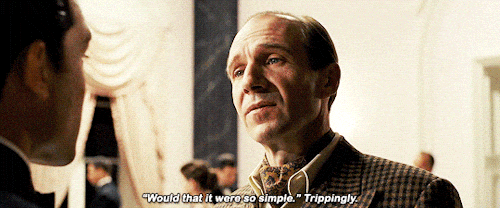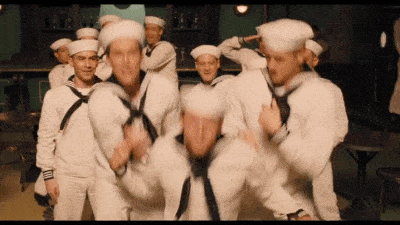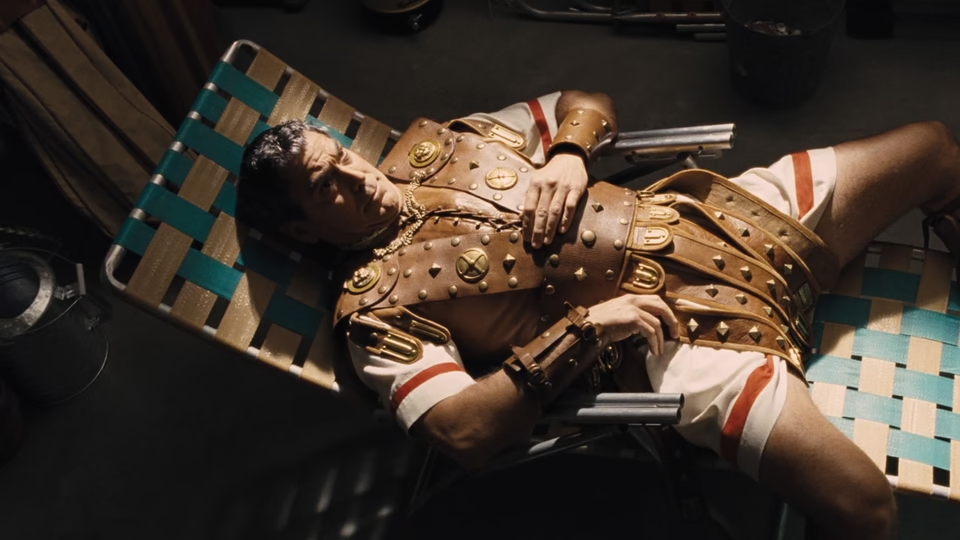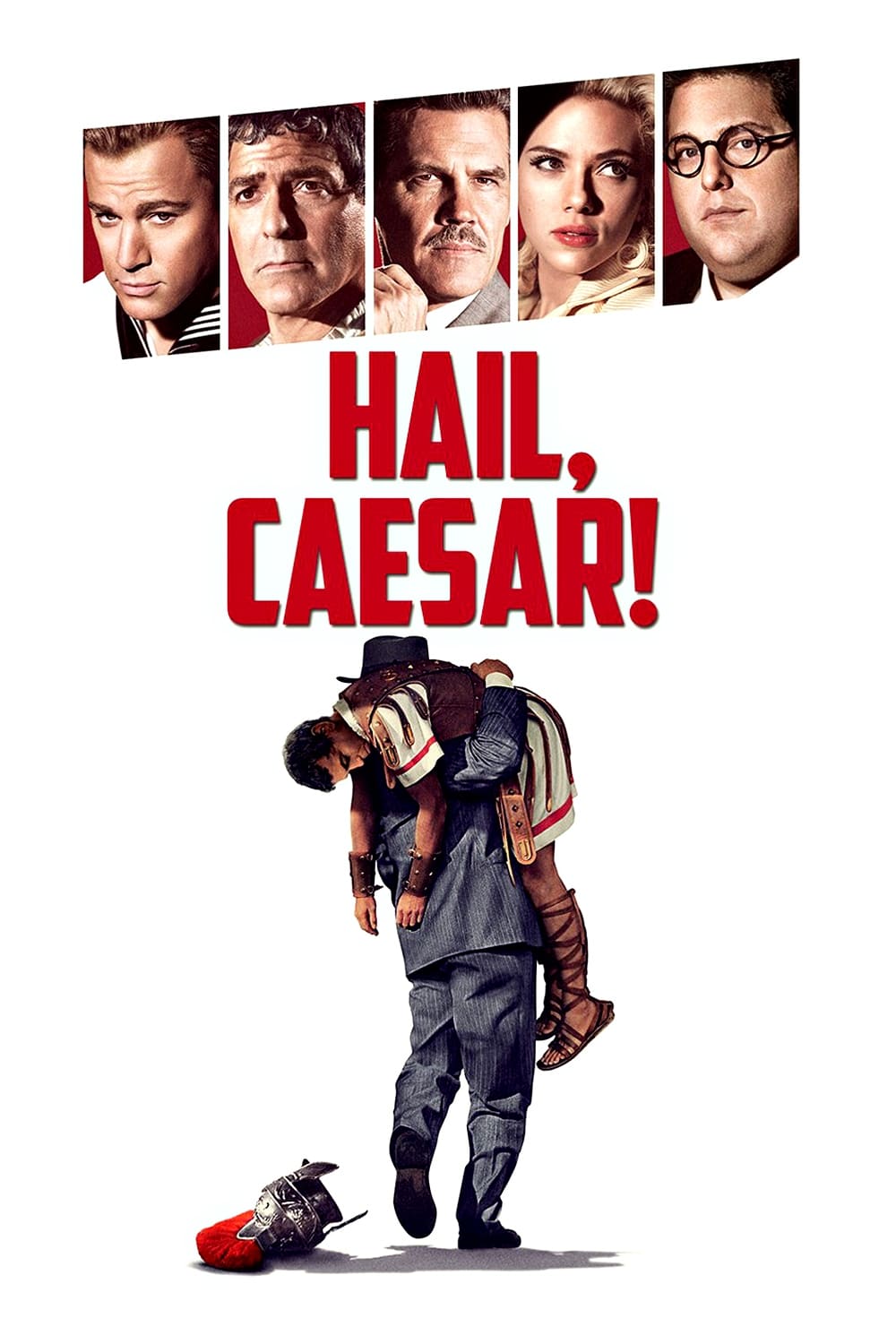It’s somewhat surprising that, of my nebulous top ten-ish favourite films, there are two that both came out in 2016, are both decidedly off-kilter and odd in their own ways, and are both ‘cult’ films to an extent – beloved by their fans, but little-known beyond those circles. We’ve discussed The Nice Guys on this site before, and today it’s time to turn to what is (in the Blog of Mazarbul’s household) its improbable companion piece – certainly, these two movies have been rewatched more than any other by my wife and I!
So, today, I figured I’d write up a few words about it – as I feel like Hail, Caesar! is both an extremely worthwhile film, and also an extremely subtle one. Plus, of course, I finally, desperately, need to reveal the truth about one of the film’s most exciting mysteries. Today, I intend to finally reveal the truth about…

…the truth about On Wings As Eagles caw.
Right, if that doesn’t mean anything to you, go watch the film (and leave this tab open so you can come back here later). It’s a really good film, I don’t think you’ll regret it. And for everyone else, let the discussion proper begin!
Hail, Caesar! is a delightful bafflement of a film, both over the top and silly and yet understated and careful. It features an utterly star-studded cast, yet this menagerie of top-tier actors barely share scenes with each other – even two of the film’s arguable co-leads (Josh Brolin and George Clooney) only meet on-screen once, towards the very end of the story. It’s a film with an abduction, theological disputes, abuses of power, earnestly uninformed economic debates, Soviet defection, and marital misdemeanours of nearly every order; yet it’s light-hearted and cheerful, even strangely optimistic at points. There’s a faux-epic scope about it – the massive film sets and choreographies and speeches are inevitably undercut by the banal and the comic, and though it never feels rushed or unsedate, the story unfolds across a strikingly short span of time – as framed by Mannix’s daily visits to the confessional.
But all of this really fails to get at the heart of Hail, Caesar!. It’s fun. In some ways, it does form a really nice complementary piece to The Nice Guys, in that both are extraordinarily clever and humorous whilst maintaining their own internal credibility. But where The Nice Guys barrels along with shootouts and chases and rapid-fire gags, Hail, Caesar! is rather less brash, rather more willing to enjoy small character moments and employing its jokes as punctuation (though both films gleefully and masterfully employ delayed punchlines…I’d explain more, but, “It’s…complicated”).
As period pieces, both films are soaked in the atmosphere and appearance of their respective eras, though for The Nice Guys the sleeze-filled neon lights of Los Angeles in 1977 become almost a fully-realised character within the film. For Hail Caesar, its own vision of ‘50s Hollywood is rather more (and rather fittingly) theatrical, a backdrop that’s just familiar enough and just alien enough to ground its characters in their own hermetic world. And while the script of each is laser-focused, The Nice Guys is preoccupied with its development of the relationship between the titular guys (and surplus non-titular daughters). Hail Caesar!, in some ways, feels rather more like a series of vignettes, with sequences such as Channing Tatum’s bawdy tap-dance, the irate bickering representatives of assorted Abrahamic creeds, and a late-night visit to facilitate the adoption of a baby by its own mother forming memorable and self-sufficient scenes in their own right.

Yet these vignettes add up into something that’s much, much more than the sum of their parts, too. Far from being a series of disconnected sketches, Hail, Caesar! does work its way through a singular plot and idea – though that, too, may be (at first glance) unclear. Since, in many ways, Hail, Caesar! features a bunch of episodes that, ultimately…don’t go anywhere. On the face of it, Hail, Caesar! seems to revel in its own lack of internal character evolution.
For many of the characters, any minimal change that they experience or are promised is undone. Baird Whitlock’s new-discovered communist ideologies, Thora (or is it Thessaly?) Thacker’s big story, and the screenwriters’ painstakingly-achieved Soviet contributions are all sunk (some more literally than others). Other characters, such as Hobie Doyle, seemingly undergo no development or change at all (significant particularly in Hobie’s case, given the prominence he assumes throughout the film).
And this, of course, culminates in Eddie Mannix himself. Having begun the film by slapping a movie star and going to confession, he ends by…slapping a movie star and going to confession. Having started the previous day with a generous offer from Lockheed to work for them, he starts the new day by turning their offer down and remaining in exactly the same job, with the same problems and same concerns, that he had had yesterday. Yet for all of these characters, Hail, Caesar! seems to be offering them the possibility of change throughout the story, only to consistently (if not inevitably) deny them the realisation and actualisation of that change.
In short, Hail, Caesar! may seem very much like a film about individual impotence and the permanence of the status quo – and to be clear, I do think that that’s a significant theme within the film. For even in Mannix’s home life, this tendency for things to work themselves out is observed in the extraordinarily fleeting subplot concerning his son. His son does not want to play shortstop, he plays shortstop, he’s happy at shortstop. Eddie Mannix does nothing, and nothing of note especially changes. There is, in short, a certain inevitability of immobility that permeates the entire story.
One might imagine that, across two hours of nothing at all happening in a movie, the story would easily become either grating or tepid, but Hail, Caesar! is clever enough to avoid that happening. Superficially, of course, the wit and delight from vignette to vignette prevents monotony from setting in, and that superficial component is an important part of the story’s success – but I think there are two deeper layers, too.
The first is also tied up in everything that I’ve described above – it really isn’t fair to describe Hail, Caesar! as being a film in which nothing happens. It is a film in which little changes, while a great deal happens. One might imagine that this is a difference merely in semantics, and that if anything that repeated thwarting of development might, if anything, be commensurately more frustrating. But the truth of the matter is that there’s something delightful about watching all these little, niggling problems just unknot themselves, and that the subtle comedic personalities that populate the film and bring about their own ineffectuality are just entertaining enough to be watchable, and just foolish enough to be unsympathetic. It’s a fine comic balancing act, and masterfully handled.
Yet even then, I think there’s yet a deeper layer to consider – a layer that reveals Hail, Caesar! to in fact have a very clear throughline indeed. And that layer is hinted at through the various amusing actors that are encountered through the story…and, further, is laid out in one of the film’s earliest and funniest scenes:
Contextless, the theological debate works as a simple and memorable skit. Yet even within the context of the film’s narrative, it is superficially not much more than yet another vignette. None of these characters (save Mannix) are ever re-encountered. There is no theme of religious tension concerning the titular film-within-a-film to run through the narrative. It is, on the face of it, merely an amusing episode in a sea of amusing episodes.
So why include it? Why this episode, in particular? What purpose, beyond facile amusement, does this scene serve for us as viewers?
Because, if I’m reading the film’s overall intent and message right, the debate of the religious leaders is itself an analogue for the issue that the film is interested in exploring – the issue of identity, and of multiple real and/or performative identities.
Note that each of the four ministers has a different understanding of what it means for Christ to have been the Son of God (or not). Each of them conceives of that identity in a different way, and each of them are convinced of slightly different views concerning Christ’s dual, or split, or fictionalised, identity. This doubt concerning multiple identities and fascination with it is, I think, what Hail, Caesar! is really about, in the end. And I think it’s worth considering all this in some detail. Because the concerns and questions and differences raised by the clerics are, in a way, questions that reflect the various characters encountered throughout the entire film.
Hail, Caesar! is, in short, a story about identity. Performative identity, dual identity, perceived identity – all of these things are reflected in the numerous characters that populate the story, just as they are issues that continue to cause schism amongst the various Abrahmic creeds and denominations.
The first and easiest indicator of this broad theme is the film’s very Hollywood setting. Tinseltown, land of illusion and dream, home of ego and career. Idols, propped up for the masses to adore even as they become bloated on their own passing fame. False friendships, betrayals, insincere smiles, duplicity…off screen and on. And Michael Gambon’s narration pays homage to this illusory quality, as he describes the work of the studios as being manufacturers of story. If you wanted to tell a story that is concerned with identity, perception, and multiplicity, it is hard to imagine a better setting than a Hollywood studio.
Identity (especially its reflective, duplicitous and/or dualistic qualities) becomes a theme that is considered through each and every character. Some of the more obvious examples are also the simpler ones, and are thus instructive to begin with – Scarlett Johannson’s DeeAnna Moran, a sweet-faced virginal and pure figure in the films, who is a chain-smoking foul-mouthed and ‘experienced’ woman the moment the cameras are turned off. Or Channing Tatum’s Burt Gurney – on film, a grinning singing dancing All-American type, portraying a feckless sailor off to service. In reality, a rather more sombre and even thoughtful Communist agent, working against his homeland (and, in what is both one of the film’s most amusing passages and the most memorable, he goes to sea not at the command of others and unwillingly, but of his own volition and in order to leave the US for good).

(It is also interesting to me that Moran and Gurney are perhaps the only characters to overcome the film’s corresponding theme of ineffectuality and impotence – the former getting married, the latter successfully committing a spot of light treason. I will return to this in a moment, but wanted to make note of it here!)
Then you have characters who are less drawn, yet the implications are clear. Veronica Osorio’s Carlotta Valdez is, on the surface, an exotic and (presumably) alluring dancer, yet her date with Hobie Doyle reveals her to be both extremely sensible and fairly honourable, enjoying her date with Hobie for the companionship and conversation. Laurence Laurentz, director of dry period romances, is revealed to have had a sordid affair at some point in the past with Baird Whitlock during the filming of On Wings as Eagles caw. On the other hand, the rapacious Thacker sisters are very clearly drawn as being two parts of the same identity, a literal split character in realisation and in their repeated ambitions to outdo the other.
One of the more extreme examples is Jonah Hill’s Joseph Silverman, the man who can be any man the studio needs. In his anonymous office, Joseph Silverman is an apparent nobody and willingly so, taking on the ‘roles’ of being a drunk driver, a scandalous lover, an adoptive father. Ironically, this complete fiction of character makes Silverman an extraordinarily reliable person, since it is through his various alleged unreliabilities that the studio is able to benefit.
However, across the meandering tale of Hail, Caesar!, three figures emerge as principal characters, and it is on them that I would like to dwell for a moment. Alden Ehrenreich’s Hobie Doyle, George Clooney’s Baird Whitlock, and Josh Brolin’s Eddie Mannix are all, in their own ways, explorations of the concept of the illusion of identity, and its transitive and important qualities.
First, Hobie Doyle. Hobie’s identity questions are, in some ways, both the most obvious of the three, and the most layered. In his introduction, Hobie is (to put it lightly) not shown as being overly intelligent. He’s a glorified stuntman, an actor with a smile just pretty enough to hide his atrocious line delivery; and with musical and horseback skills that earn him roles in lowbrow cowboy films.
This impression of Hobie, curiously, isn’t peeled away immediately, but is doubled down on when he is forced at the studio’s whim to star in the genteel Merrily We Dance, a societal drama which the drawling Hobie is utterly unsuited to in any way, shape, or form. Would that it were so simple for the newly besuited Hobie to navigate this unfamiliar world, his inept line-readings and awkward movements belying his incompetence. Hobie, in short, seems an utter fool.
And yet. The moment Hobie is removed from the elegantly frivolous world of Laurence Laurentz, the young man proves himself to be an extremely astute, kindly, and thoughtful person. It is his suggestion that Eddie Mannix investigate the extras in order to find out what has happened to Baird Whitlock (and, though Hobie’s suggestion is delivered with a certain baffling logic (“All I’m saying: you look at an extra, you got no idea what he’s thinking”) his overall reasoning…that the extras come and go, while other production staff remain constant…is not unsound). He proves himself charming and entertaining dinner company, despite the unconventionalness of his table manners.
And, following his (again very practical) suggestion that Mannix secure the cash-filled suitcase with a belt, Hobie is perceptive enough to notice the same embelted suitcase with Burt Gurney, and has the presence of mind to follow Gurney and rescue Baird Whitlock. There is, in short, a great depth to Hobie, a depth that no number of horseback stunts or trippingly rueful line deliveries would ever reveal – yet it is revealed to us as we follow his story through the day.
This, naturally, forms a striking contrast with the aforementioned Baird Whitlock. Whitlock’s dualities are, perhaps, less emphasised than those of Hobie, yet they are present. In Whitlock’s role in the titular film-within-a-film, he plays the Roman centurion Autolochus, a soldier who, Ben Hur-like, encounters Jesus Christ of Nazareth and is led to a religious epiphany at the film’s climax, a profound and meaningful piece of character development. Autolochus is a leader, an articulate and poetic warrior, a convert to the nascent truths revealed by Christ Himself.
Whitlock, too, undergoes epiphany, like the character he portrays…with, of course, a wonderfully subversive difference. Where Autolochus’ epiphany is divinely inspired, a true and real and meaningful piece of conversion, Whitlock is seemingly convinced by any idea he chances upon; being completely sold on the communists’ arguments over the course of a long afternoon. Yet despite his enthusiasm, Whitlock’s understanding of even basic socialist tenets is demonstrably vapid and inane. Further, even his faith in them is a poor and passing episode, for when he enthusiastically begins to explain The Future to Eddie Mannix, it takes but a few well-judged slaps to dislodge any and all of Whitlock’s newfound political convictions. In his films, Whitlock is a commanding, eloquent, inspiring presence – outside of them, a thoughtless buffoon and a self-centred ass.

And so we come, at last, to the lead of Hail, Caesar! and, notably, one of the film’s only straightforward characters…the brusque and efficient and hardworking Eddie Mannix. On the face of it, Mannix does not possess the mirage-like qualities of the numerous actors that he desperately shepherds. He does not grow, or change. He does not show himself at any single point to be anything other than he is.
Yet woven into Mannix’s story is a seemingly disconnected tale, as he is offered a lucrative position with Lockheed Aviation. Again, the Lockheed story is seemingly disconnected from the other little plot threads that run through Hail, Caesar!, seemingly only linked by virtue of the crazy day that Mannix is having. You don’t want this, Cuddahy tells Mannix. The demands placed on you are unreasonable, the folk you’re surrounded with are unprofessional. And so Eddie Mannix is, throughout the story of Hail, Caesar!, wrestling with the opportunity presented to him by Lockheed. Better hours, better pay, better company. It should be an easy choice.
But Mannix, in the course of that single day that Hail, Caesar! takes place over, is constantly surrounded by people pretending to be something that they are not. Mannix, whether directly or indirectly, is observing and enveloped by dozens of people who are faking it. And the irony of his leaving his Hollywood position is that he, too, would be ‘faking it’ in Lockheed’s world. In a world of lights and cameras and fiction, Mannix is actually (and perhaps uniquely) himself…and he knows that if he were to accept Lockheed’s proposition, this would force him to be someone else.
Mannix, by virtue of being surrounded by people who are assuming some performed identity, is himself able to recognise the dangers and struggles of personal inauthenticity. It may be a rubbish job, and a difficult one, and a thankless one, and a tiring one, but it is one that allows Eddie Mannix to be Eddie Mannix, and this is why he ultimately turns down Lockheed – because he does not want to be something he is not.
Thus, Mannix does not change, but that is because Mannix learnt that he did not need to change. Intriguingly, the two characters who do both ‘achieve’ something by the story’s conclusion – DeeAnna Moran and Burt Gurney – arguably come to the opposite epiphany. In the case of both of them, they have wearied of pretending to be something that they are not, and so actualise a meaningful change in their lives (notably, both also do so via the aid of an external power…marriage and the Soviet Union, respectively).
I think this is why I’d resist a reading of Hail, Caesar! that is wholly concerned with the futility of endeavour. Very little changes by the end of the film, it’s true, yet change is affected – and in those cases, it is affected by a whole-hearted committal to the change and a refusal of past inauthenticity. At the same time, Mannix could have changed had he wished to, but the film does not posit that he is wrong to turn down Lockheed. Rather Mannix, too, is rejecting potential inauthenticity in choosing which master he will serve.
Even the name of the film is reflective of this duality and choice – or more accurately, the name of the film that the film is named after. Hail Caesar : A Tale of the Christ. On the face of it, the title of Whitlock’s film is simply an on-the-nose evoking of the Biblical epics of yesteryears. Yet the very usage of both ‘Caesar’ and ‘Christ’ in the name recalls not one, but two different passages from the Gospel of Matthew (and given the the very strong religious undertones that run through the film, I do not think that this is accidental), most obviously the following tale:
Then the Pharisees went and took counsel how they might entangle Him in His talk. And they sent out unto Him their disciples with the Herodians, saying, “Master, we know that thou art true and teachest the way of God in truth; neither carest thou for any man, for thou regardest not the person of men. Tell us therefore, what thinkest thou? Is it lawful to give tribute unto Caesar, or not?” But Jesus perceived their wickedness and said, “Why tempt ye Me, ye hypocrites? Show Me the tribute money.” And they brought unto Him a penny. And He said unto them, “Whose is this image and superscription?” And they said unto Him, “Caesar’s.” Then said He unto them, “Render therefore unto Caesar the things which are Caesar’s, and unto God the things that are God’s.” When they had heard these words, they marveled, and left Him and went their way.
The Gospel of Matthew, 22 : 15-22
Christ’s words in this passage in turn evoke one of the more striking individual verses from the same Gospel:
No man can serve two masters; for either he will hate the one and love the other, or else he will hold to the one and despise the other. Ye cannot serve God and mammon.
The Gospel of Matthew, 6 : 24
So much of Hail, Caesar! is concerned with the serving of two masters, and with the need to discern which master to serve. It’s integral to the entire film’s story, and is the reason why I believe the film succeeds not merely as a series of lukewarm sketches, but as a complete and compelling piece of narrative. Yet it’s also incredibly subtly woven in. There’s no moral being delivered here, no lesson to be learned by us the audience. The film succeeds because it is convinced of its own thematic material, and because that thematic material permeates the entire picture without once becoming overbearing.
Hail, Caesar! is ultimately about identity, about the intersection of fiction and self, and about choice. It is about the inefficacy of inauthenticity, and about the need to commit to both self and master. Every character demonstrates this in some manner…and all of it feeds into Mannix’s own personal story, of choosing to be himself. It’s a surprisingly thoughtful story, yet entirely fitting to the setting, the performances, and further manages to deftly tell itself in an entirely entertaining manner, such that the central thematic material itself is both fully successful and entirely unobtrusive.
I love Hail, Caesar! It’s funny, clever, brilliantly performed, wonderfully shot and constructed, and utterly charming in a very understated way. But there’s a lot going on behind the scenes, too, which lends it both a watchability and a worth that I think is not easily matched. I’d highly recommend watching it, or even rewatching it, with an eye to those issues of agency and identity. The sheer care with which it is constructed on every level – performances, script, theme – truly forms a film that is far, far more than the sum of its already excellent parts.

~~~~~~~~~~~~~
Thanks for reading – feel free to check out anything else you may be interested in on the blog, there’s plenty more to discover! Follow me on Facebook and on Twitter to stay up to date with The Blog of Mazarbul, and if you want to join in the discussion, write a comment below or send an email. Finally, if you really enjoyed the post above, you can support the blog via Paypal, and keep The Blog of Mazarbul running. Thanks for reading, and may your beards never grow thin!
